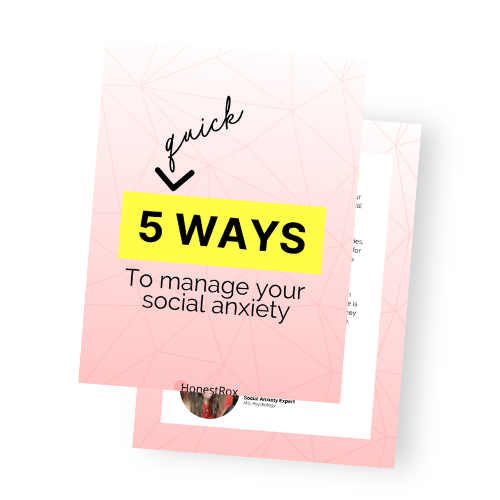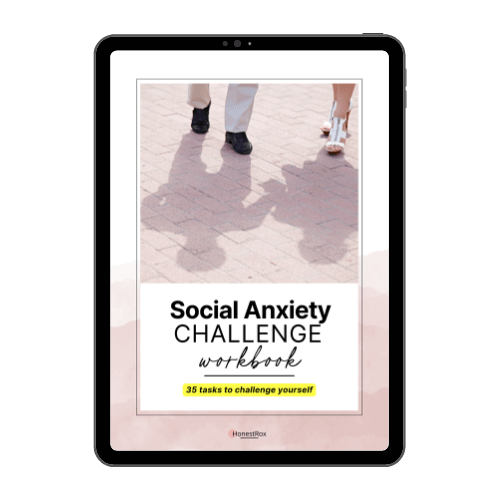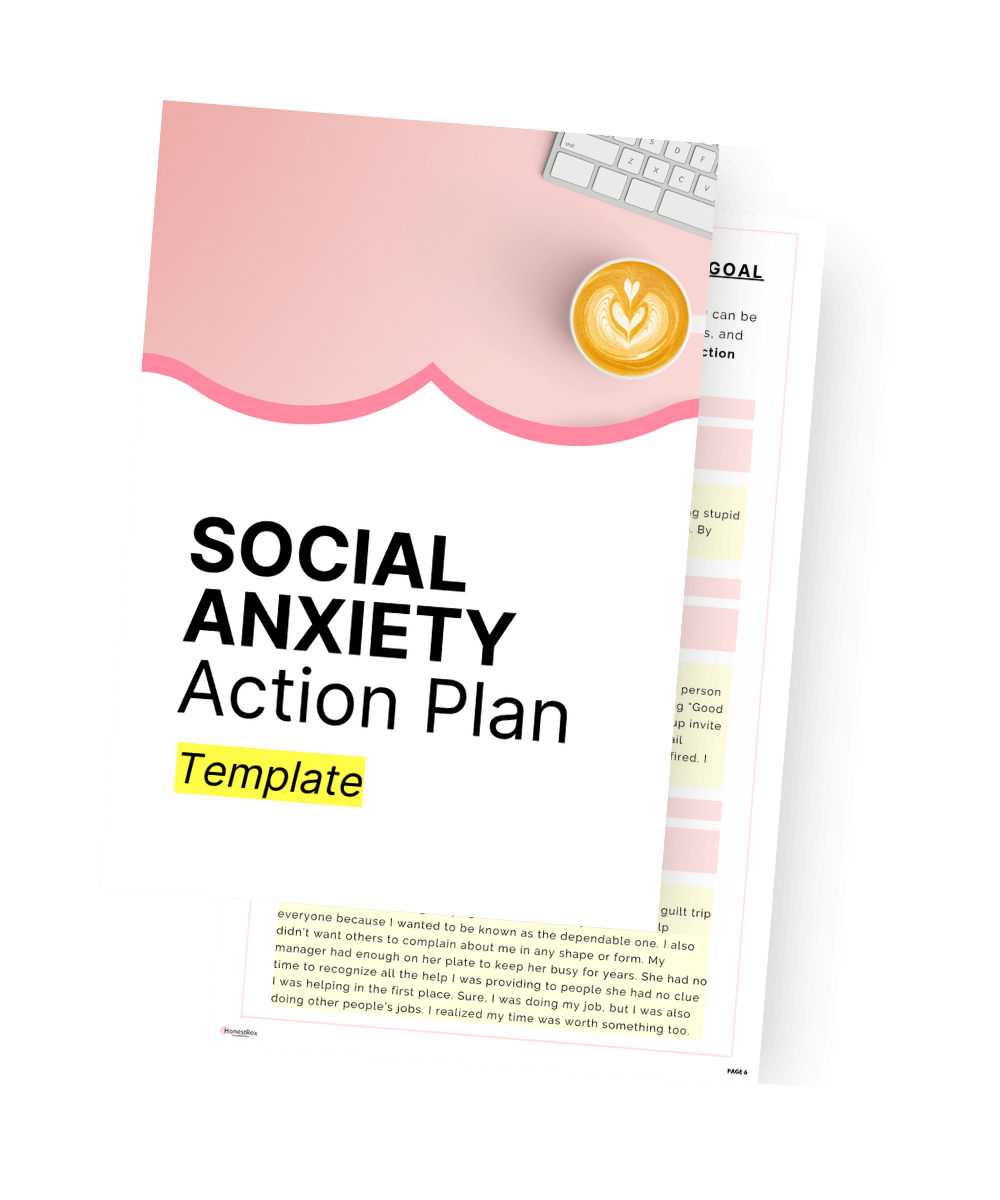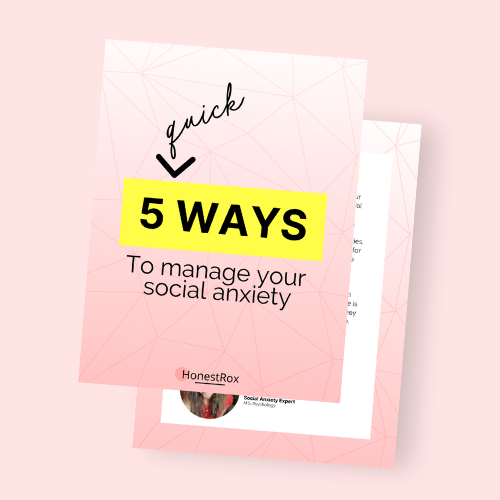
Social Anxiety
How to Stop Stumbling Over Your Words: Tips For Managing Social Anxiety
If you’re at a loss for words and feel like you forgot how to speak, here are 6 ways to stop stumbling over words
Do you find yourself stumbling over words because of your social anxiety?
Maybe you recently had a moment, or let’s be honest, a million moments, when you just stumbled over your words, mumbled them upside down, and cringed at how inarticulate you can be.
You even went so far as to call yourself “stupid”…tsk.
Part of the reason why I’ve been stumbling over words (other than social anxiety) for most of my life is that I’m a polyglot.
And as such, I tend to stumble over words oh-a-plenty-of-times, and if it happens frequently enough during a week, my social anxiety kicks into high gear.
It’s like the chicken and the egg. I am still trying to figure out which one fuels which.
And then it’s much more challenging to tone it down than it is to keep it in check.
I’m talking total confidence shutdown.
- Inferiority complex bangs on the door
- Impostor syndrome clocks in
- Negative inner talk takes over
Below is an example of a time when I wished someone would pull me away from the interaction because I couldn’t stop stumbling over words.
My manager called up a team meeting to let us know that college students were coming to the office to learn more about what it’s like to, you know, work. It was a cooperation between our company and the local university.
Before I even had a chance to hide in the corner, my manager volunteered me as a “mentor” for a student. Great.
Don’t get me wrong. I have no qualms about participating in knowledge transfers (although I prefer when I’m the one getting the knowledge), but it just so happened that I was bored at work and didn’t have much to showcase.
Hey, look at me. I’m getting paid to be bored.
This made the task at hand much more difficult.
Imagine trying to come up with what you’ve worked on in the past week when all you did was Instagram (and no, that’s NOT part of your job description).
It was like that.
So, there I was, staring at a first-generation college student named Briana. She was going to shadow me, and let me tell you; she was bright, perky, and wide-eyed, ready to learn about the IT department, corporate America, and what it takes to get your foot in the door.
As I sat there explaining to her what I do and what my current project was all about, I couldn’t help but lose control of my English. I had to defend my position and come up with reasons why I was employed.
Of course, that triggered my social anxiety and made me stumble over my words.
And I mean, how did I even graduate High School stumbling over words like that?!
I could see myself from her perspective, and it made me uncomfortable. As I felt her judging me, I knew there was no way I could bring myself to sound coherent.
I babbled on and tried to convey my role as best I could, but my inner talk grew louder and louder as the minutes passed.
It made me feel like I didn’t know what I was doing.
It made me insecure about my communication skills, reigniting my impostor syndrome and activating my negative inner critic.
When you’re stumbling over words, it’s easy to fall into the trap of believing you’re not good enough and don’t know enough that you’ll never make it through.
I imagined her thinking:
- How can she possibly oversee this project if she can’t explain it to me?
- I could do this better than her!
- Are they paying her for this?!
- Why is she sweating? The AC is definitely on high here.
It made me feel small. And I hate feeling small.
But ultimately, there were two ways I could have reacted to my reaction.
One way was to commiserate for days on end about failing at life, and the other was to give me a break.
I decided not to think about how I could have portrayed myself better because I wanted to avoid the rabbit hole of why I couldn’t explain myself adequately (save the sad excuses for another time).
I didn’t allow myself to think that a more significant problem was at stake.
Hypochondriac anyone?
My inner talk took a backseat as I decompressed and hugged myself for not having a good day. I told myself I wouldn’t stumble over words the next time.
If you are at a loss for words or cannot express yourself the way a British playwright would (we can always dream), cut yourself some slack.
Don’t overwork your brain because it’s already overworked.
Not only are you doing yourself more harm by forcing your brain, but you’re inviting a slew of other issues through the door, i.e., insecurities that are better off hiding in the darkest corners of your mind.
We all have those moments where we ramble and make a fool of ourselves – and while that’s tough for anyone, it might be more challenging for introverts because most of us pride ourselves on being methodical and careful with our words.
This is the extrovert equivalent of getting mad-ass drunk at a party and leaving behind a trail of unsavoury pictures for the world to see.
The same feeling, I imagine…
But fear not, you can always redeem yourself, and I’ll tell you how.

Free Social Anxiety Action Plan
This action plan was my starting point. It helped me manage my social anxiety step by step, and I hope it can do the same for you!
Here’s how to stop stumbling over words if you have social anxiety:
1. Slow down
If I don’t make it a point to speak slowly, I get agitated and jump from one explanation to the next without any correlation.
Speaking fast derails me and makes me forget what I want to say.
But that’s not even the worst of it…it makes me look incompetent, among other things.
Here are three reasons you’ll benefit from slowing down when you speak:
1. Your nervousness will take a hike.
Adrenaline is best friends with stress, which means that the more stressed you are (especially after a few stumbles), the more adrenaline spikes.
That’s correlated with an increased heart rate.
And if you’d be so kind as to complete this sentence, an increased heart rate means increased ___.
Not only will you feel more nervous when you’re speaking, but you’ll also look like you are. Thus, you’ll be forever stuck in a vicious circle.
2. You’ll be in more control.
By speaking slowly, you’re giving yourself extra time to dig into that impressive repertoire of words you know.
This will allow you to fetch the best word for the situation and steer the speech in a different direction should you realize that it needs to catch up with your audience.
You can think of it as slowing downtime, which gives you the upper hand in analysing the person in front of you and their reaction to your words.
3. You’ll gain credibility and authority.
Think about your favourite orators. How fast/slow do they tend to speak? Speaking slowly shows credibility and authority because you’re taking time at the table.
It’s also a sign of confidence and expertise, both characteristics you want to have!
2. Organize your thoughts
Before you meet with someone, jot down the sequence of your ideas so you can have a rough outline of how you’ll approach the discussion/conversation.
This usually works better when you know who you’re meeting when you’re meeting and the agenda/topic of conversation.
Impromptu conversations are much harder to organize but possible.
I’ve written about this before, but I tend to role-play conversations with people beforehand to arm myself with present knowledge. If I know how to approach someone, say the college student who shadowed me, I’ll be better equipped with the right words.
I wouldn’t have floundered so severely if I had a plan, but I chose to speak like it’s the wild west.
3. Take your time
Take your time to ensure you’re not missing anything crucial – don’t feel rushed to get to the end.
This is related to #1, but more in the sense of allowing yourself to pause between sentences, allowing the silence to work to your advantage.
DON’T BE AFRAID OF SILENCE.
If there’s one thing you should learn to do, especially if you have social anxiety, it’s learning to love the silence. Don’t try to fill the silent space with useless words. It will just make it worse because you’re going to panic about it.
Give yourself enough time to 1. Speak slowly, and 2. Organize your thoughts.
See how they are all related but different in their way?
4. Ask questions
What part of this makes sense? What doesn’t make sense? Did I miss the point?
You can engage the other person to ensure they follow your train of thought.
If you did #1, #2, and #3, the chances are that they understand you just fine! But just in case you missed a few steps or saw them squint their eye strangely, please stop and ask questions to make sure that what you’re saying is clicking.
The last thing you need/want is validation that you’re not making sense.
So don’t let it get that far. Intervene occasionally to check in on them.
5. Start over
Don’t be scared to stop, take a breather, and restart.
We know it works for computers; let’s assume it works for humans too.
Just let the other person know you’re restarting. Being funny always resets the mood, so you can say something like: “I know this probably makes no sense to you – I apologize. I’ve been talking too much to a baby these past few days! Let me reset.“
Being honest and vulnerable are probably the most powerful weapons to combat social anxiety, especially when words escape you and you feel naked and afraid.
6. Repeat these words: It’s just a phase I’m in
The truth is that it’s cyclical. Maybe you had a rough night, didn’t sleep, and now your fatigue is playing games with you. Perhaps you’re more stressed out than usual, so you’re on edge trying to keep a cool head.
Whatever the case, you’re in a “stumbling over words” phase. I even made a video while I was in this phase. It sucks, and sometimes it lasts longer than I’d like it to.
But even then, I repeat to myself that it’s just a phase I’m in, and my brain will rectify itself. It might feel like it won’t, but trust me, your brain will figure it out.
Also, one crucial point to remember for all this to work is to let go of any expectations of yourself.
If you plan to bring out a whole dictionary to impress someone, no matter how much you try to complete these steps, you’ll need to remember how to speak because you’re putting too much pressure on yourself.
Always remember that the simpler the words are, the more impact you can make.
And if you have social anxiety, your main priority will always be to stay away from the vicious circle of thoughts, and the best way to make that happen is not to have high expectations.
Because the moment you fail to meet them, the inner talk begins, and then everything else unravels right in front of you.
I’ll leave you with this. If you realize what’s happening, especially at the moment itself, and take steps to recalibrate, don’t be scared to speak Chinese sometimes.
And if Social Anxiety has you stumbling over words, revert to these six things, and you won’t forget how to speak anymore.
I walk you through my experience with stumbling over words, especially while trying to mentor a student at work.
Here are the 6 steps to prevent your brain from freezing up:
- Slow down
- Organize your thoughts
- Take your time
- Ask questions
- Start over
- Repeat these words
Go back up and read why each of those is essential in reducing how often you find yourself stumbling over words.

I'm Roxana

I went from being scared to ask a question out loud to hosting summits online. I love coffee, french crepes, and working from home. My mission? Help others build their social confidence to make friends, have conversations, and be comfortable around people!
Did you find value in my content? Support me by clicking the button!
Recent blog posts
Latest Episode

About the blogger
I'm Roxana Alexandru
As a social anxiety expert I share my best strategies and tips that I’ve learned on my journey to help you manage your social anxiety.
Like what you see here?
Check out the blog!
Must Reads
Grab these freebies
Free Challenge
5 tasks. 3 difficulty levels. Test your social anxiety through exposure therapy.
Grab these freebies
Free Download
Get the template that I personally used and create your own steps for your journey.
A podcast meant to help you be comfortably you, no matter the situation. My goal is to give you the confidence to go out into the world, share your worth, build meaningful relationships, and see yourself as highly capable. It all starts with being your awkward self comfortably.
Awkward together
The “Be socially confident” newsletter drops weekly to inspire, entertain, motivate, and educate you about social anxiety (who knew it could be so much fun?!). Honestly, if anything, you’ll get a kick out of my own experiences and the funny GIFs.

Call me Rox!
I’m obsessed with social anxiety. In a healthy way! After a decade of being debilitated by it, I finally have the tools I need to manage it (the journey itself is no joke). I now use my experience to help others.














